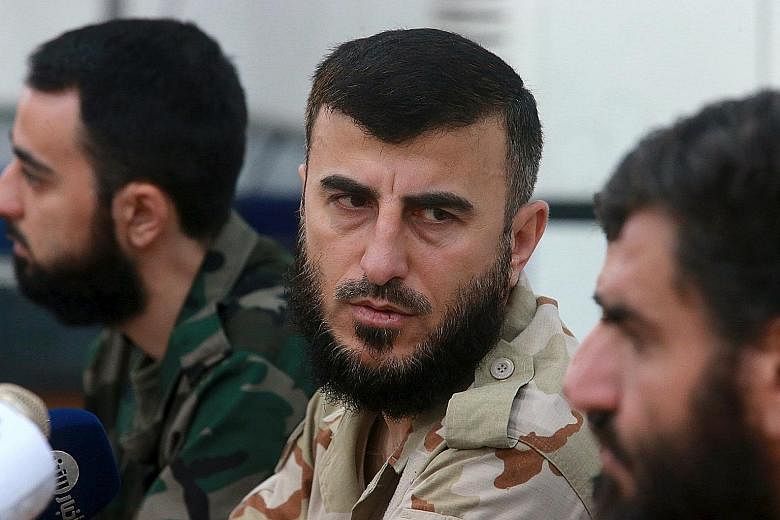BEIRUT • The commander of one of the most powerful Syrian insurgent groups in the suburbs of the Syrian capital, Damascus, was killed in an air strike, according to the government and its opponents.
The death of commander Zahran Alloush on Friday is a significant blow to the armed opposition, bolstering President Bashar al-Assad ahead of a planned new round of peace talks.
He led the Army of Islam, a group that had recently agreed to participate in a political process seeking to end the five-year-old conflict. The Army of Islam is regarded by the Syrian government and its most powerful ally, Russia, as a sectarian, terrorist group that differs little from more extremist groups like the Islamic State in Iraq and Syria (ISIS).
Local opposition figures in Damascus said the air strikes had been carried out by Russian warplanes, but that information was not immediately confirmed by Russian or Syrian officials.
Analysts said the strikes were in keeping with longstanding efforts by the Syrian government and its allies to eliminate groups claiming to occupy a middle ground between Mr Assad and ISIS. The Army of Islam sent members to Riyadh, Saudi Arabia, this month for talks among opposition groups aimed at choosing representatives for a third round of international peace talks, scheduled for early next year.
Unlike harder-line armed groups, the Army of Islam has shown a recent interest in taking part in politics, said Mr Ibrahim Hamidi, a Syrian correspondent for Al Hayat, a pan-Arab newspaper.
Mr Hamidi, who opposes the Syrian government, said that by having successfully targeted Alloush, Mr Assad and his Russian allies had demonstrated their desire to pursue a military solution. "This is a rejection of the Riyadh talks," he said.
The Army of Islam controls much of the urban sprawl east of Damascus known as East Ghouta, an area that has been under blockade and bombardment by government forces for the better part of four years.
Government supporters welcomed Alloush's death, blaming him for periodic shelling of civilian areas in Damascus. Government opponents said he had been instrumental in restraining more extremist groups from unleashing worse attacks on the city.
The opponents also argue that the Army of Islam, which sees ISIS as an enemy and competitor, has been crucial in keeping that group from encroaching closer to Damascus, and with that weakening, it could open the door to advances by ISIS fighters.
The Army of Islam could be particularly vulnerable because it was organised around a single charismatic individual, more so than many other rebel groups.
Alloush, a religiously conservative Sunni Muslim, had a history of making sectarian statements. But after having met with United States officials recently, he softened his tone.
In interviews with the McClatchy news service, he denounced sectarian or partisan rule of Syria, and said he believed that the country should be governed by a "technocratic, professional" body.
The strike on Alloush - which activists said took place as he met with another insurgent group, Ahrar al-Sham - came as ISIS fighters prepared to evacuate from the Palestinian refugee camp of Yarmouk, south of Damascus, in a deal involving the government, ISIS, other Syrian insurgent groups, Palestinian factions and the United Nations.
NEW YORK TIMES

